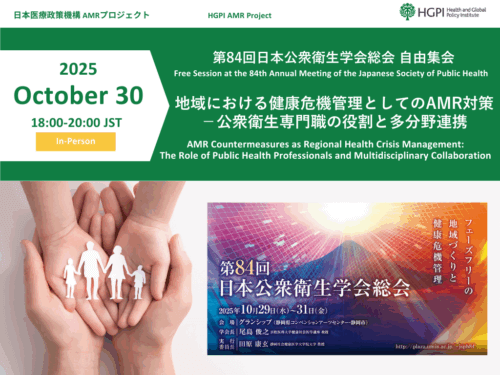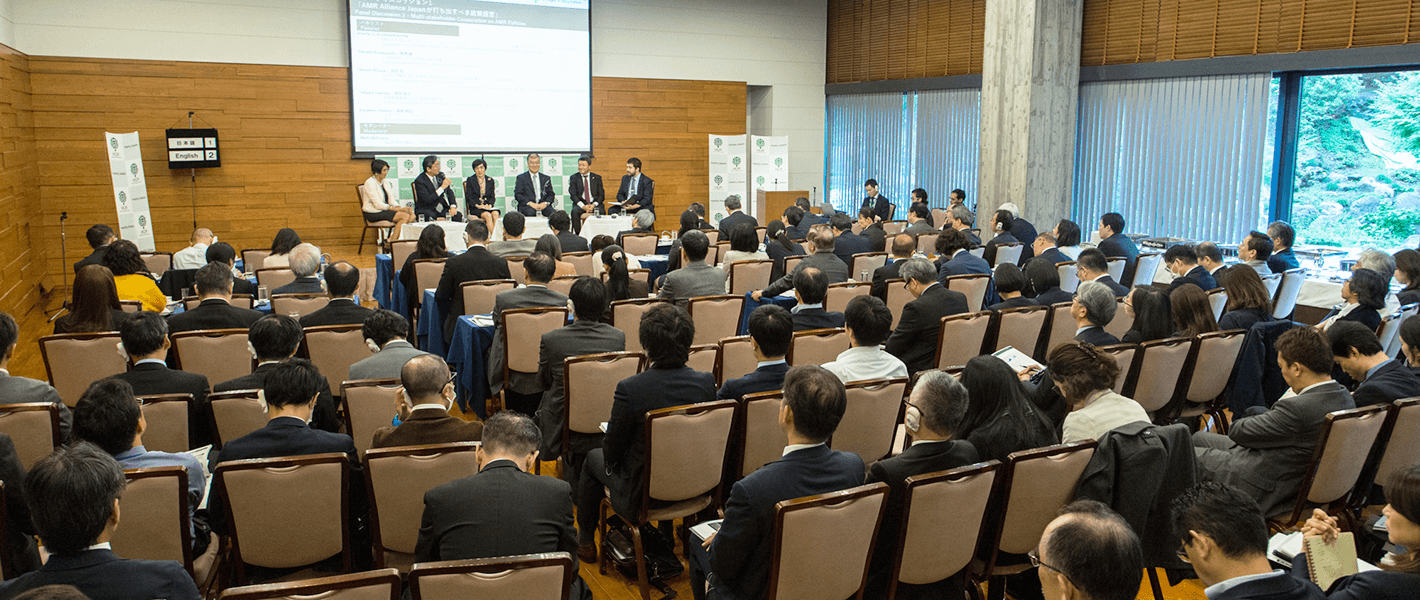[Registration Open] Free Session at the 84th Annual Meeting of the Japan Society of Public Health “AMR Countermeasures as Regional Health Crisis Management: The Role of Public Health Professionals and Multidisciplinary Collaboration” (October 30, 2025)
- Home >
- Information >
- Event >
- [Registration Open] Free Session at the 84th Annual Meeting of the Japan Society of Public Health “AMR Countermeasures as Regional Health Crisis Management: The Role of Public Health Professionals and Multidisciplinary Collaboration” (October 30, 2025)
 Health and Global Policy Institute (HGPI) and AMR Alliance Japan will host a free session titled “AMR Countermeasures as Regional Health Crisis Management: The Role of Public Health Professionals and Multidisciplinary Collaboration” at the 84th Annual Meeting of the Japan Society of Public Health on Thursday, October 30, 2025.
Health and Global Policy Institute (HGPI) and AMR Alliance Japan will host a free session titled “AMR Countermeasures as Regional Health Crisis Management: The Role of Public Health Professionals and Multidisciplinary Collaboration” at the 84th Annual Meeting of the Japan Society of Public Health on Thursday, October 30, 2025.
Antimicrobial resistance (AMR) is an urgent global and public health challenge, as explicitly stated in the World Health Organization (WHO)’s “AMR Global Action Plan” and the Japanese government’s “AMR Action Plan 2023-2027.” AMR not only complicates infection treatment in healthcare settings but also profoundly impacts community health management in daily life, posing the risk of a serious health crisis that threatens future healthcare delivery systems. Inappropriate antibiotic use accelerates the emergence of resistant bacteria, putting even advanced medical treatments like surgery and cancer therapy at risk. Particularly in Japan, where the population is rapidly aging, rigorous infection control and appropriate antibiotic use in medical and nursing care facilities become even more critical. Furthermore, it is essential for every community member to develop accurate knowledge regarding antibiotic use and learn to practice infection prevention and proper antibiotic use in daily life as part of AMR countermeasures.
This initiative, grounded in the overall theme of “Building Phase-Free Communities and Health Crisis Management,” positions AMR countermeasures within routine public health activities, educational support for local residents, and awareness campaigns. It aims to establish AMR countermeasures as an integral part of everyday health crisis management. This enables us to explore concrete measures that contribute to building a “phase-free” system capable of protecting the lives and health of local residents not only in times of peace but also during emergencies like pandemics or natural disasters, which can occur at any time.
Our organization held a preliminary Public Health Seminar in July 2025 targeting public health professionals and others professionals from local governments. Under the title “AMR Countermeasures to Protect Community Health: A Public Health Perspective,” the seminar featured presentations from multiple local government and public health center representatives sharing concrete examples of municipal AMR initiatives. These practical examples highlighted the importance of integrating AMR countermeasures into existing programs like maternal and child health, food sanitation, and tuberculosis control, as well as the critical role of multi-sector collaboration involving healthcare institutions and livestock producers for effective AMR management.
This upcoming meeting will be a development of the July seminar by providing an opportunity to collectively consider local government AMR countermeasures within the Japan Society of Public Health, a forum for discussing the forefront of public health in Japan. The meeting will first provide an overview of the institutional positioning of AMR countermeasures within national and prefectural medical plans, infectious disease prevention plans, and other frameworks. Building on this, we will share concrete examples of initiatives by local governments and public health centers. Drawing on discussions from the July seminar, we will also explore the underlying perspectives, motivations, and practical barriers faced by the professionals involved in these activities. Presentations and survey reports will highlight the “One Health Approach”, an integrated view of human, animal, and environmental health, as key, touching on strategies and insights for fostering collaboration among diverse stakeholders.
The subsequent discussion will provide an opportunity for dialogue between speakers and participants, aiming to identify the next steps for advancing more practical AMR countermeasures. Participants will brainstorm ideas, considering the specific characteristics of their own regions and work, on how to incorporate elements of AMR countermeasures into their daily personal health service and objective health service (health consultations, health checkups, vaccinations, hygiene management, food inspections, etc.), linking these to concrete project plans and action plans. This will create an opportunity for each participant to take a concrete first step toward enhancing the overall health and crisis management capacity of their community through their daily work.
*Registration is on a first-come, first-served basis and will close once the set-capacity is reached (application deadline: Wednesday, October 22, noon).
**After registration is complete, a confirmation email will be automatically sent to the email address you provided. If you do not receive it, please contact info@hgpi.org
[Event Overview]
- Date & Time: Thursday, October 30, 2025, 18:00-20:00 JST
- Format: In-person
- Venue: Shizuoka Convention Arts Center “GRANSHIP”
2nd Floor Waiting Rooms 2 & 3 (the 84th Annual Meeting of the Japan Society of Public Health, Venue 15)
(2-3-1 Higashi-Shizuoka, Suruga-ku, Shizuoka City, 〒422-8019) - Language: Japanese
- Participation Fee: Free
- Capacity: 50 participants
- Organizers: Health and Global Policy Institute (HGPI), AMR Alliance Japan
- Target Audience: Public health professionals primarily engaged in public health/health activities at local governments, as well as local government officials, healthcare professionals, and academic experts interested in AMR countermeasures
*This session will be held as part of the 84th Annual Meeting of the Japanese Society of Public Health, but if you attend this session ONLY, you DO NOT NEED to register or pay the registration fee for the meeting.
[Program] (Titles omitted)
18:00-18:10 Opening Remarks and Introduction
Yui Kohno (Manager, HGPI / AMR Alliance Japan)
18:10-18:40 Presentation: AMR Countermeasures as Health Crisis Management: The Expected Role of Local Government Staff
Michiko Nagamine (Director, Itabashi City Public Health Center, Tokyo)
18:40-18:55 Research Report: Current Status and Challenges of AMR Countermeasures in Local Governments
Daichi Watanabe (Senior Associate, HGPI / AMR Alliance Japan)
19:00-19:45 Discussion: Considering Phase-Free AMR Countermeasures for My Region/Work
Yui Kohno (Manager, Japan Health Policy Institute)
19:45-19:50 Summary and Closing Remarks
19:50-20:00 Networking
■ Speaker’s Profile (Titles Omitted)
Michiko Nagamine(Director, Itabashi City Public Health Center, Tokyo)
 Michiko Nagamine graduated from Tokai University School of Medicine. She completed initial residency and worked in the Department of General Medicine at Kawasaki Municipal Kawasaki Hospital, then obtained a Diploma in Tropical Medicine and Hygiene (DTMH) from Mahidol University in Thailand. She has worked in multiple municipalities, including Shinjuku City, the Tokyo Metropolitan Government, Setagaya City, and Minato City, engaging in infectious disease control, health promotion, and preventive measures. In particular, she served as Head of the Infectious Disease Control Section at the Setagaya City Public Health Center, Head of the Health Prevention Section at the Minato City Public Health Center, and Director of the Tokyo Metropolitan Tama-Tachikawa Public Health Center, before assuming her current position in 2025. She is a Certified Physician by the Japanese Society of Internal Medicine, certified ICD by the ICD Certification Council, certified specialist by the Japan Public Health Association, supervising physician by the Japanese Society for Tuberculosis, and holds a Doctor of Medicine degree.
Michiko Nagamine graduated from Tokai University School of Medicine. She completed initial residency and worked in the Department of General Medicine at Kawasaki Municipal Kawasaki Hospital, then obtained a Diploma in Tropical Medicine and Hygiene (DTMH) from Mahidol University in Thailand. She has worked in multiple municipalities, including Shinjuku City, the Tokyo Metropolitan Government, Setagaya City, and Minato City, engaging in infectious disease control, health promotion, and preventive measures. In particular, she served as Head of the Infectious Disease Control Section at the Setagaya City Public Health Center, Head of the Health Prevention Section at the Minato City Public Health Center, and Director of the Tokyo Metropolitan Tama-Tachikawa Public Health Center, before assuming her current position in 2025. She is a Certified Physician by the Japanese Society of Internal Medicine, certified ICD by the ICD Certification Council, certified specialist by the Japan Public Health Association, supervising physician by the Japanese Society for Tuberculosis, and holds a Doctor of Medicine degree.


